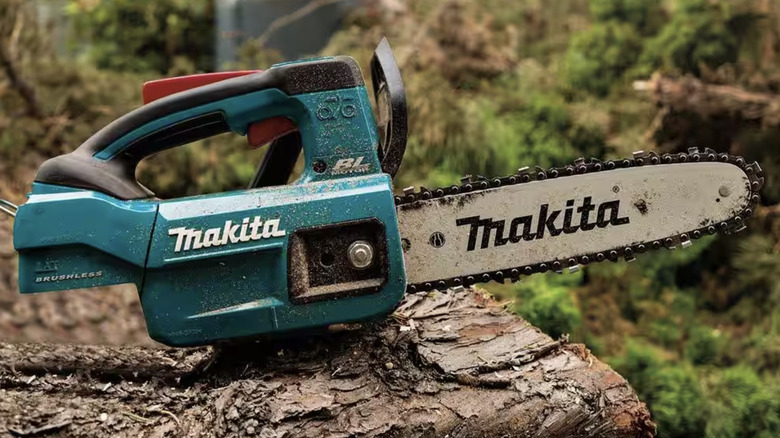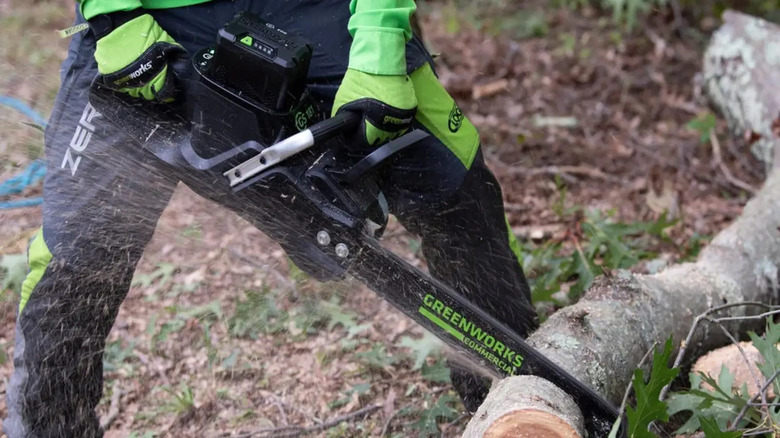Electric Chainsaw Pros And Cons You Should Know Before You Buy
As technology advances, more eco-friendly products are being thrown into the mix. Even states like California have moved to ban gas-powered generators and even smaller outdoor tools like gas-powered lawn tools. Because of this, several industries are being affected. Many tool companies like Dewalt, Makita, and Milwaukee have created full battery-operated lines for nearly every tool you can imagine to counter these environmentally friendly actions. Even a battery-powered mower that is part of Makita's 18V LXT battery system for lawn tools.
With that being said, how are electric tools, especially for this article, electric chainsaws, affecting how a typical consumer would use them? Gas-powered chainsaws have been around for a while and have proven their worth for many different jobs. With electric chainsaws in the mix, though, it may be noteworthy to understand the pros and cons of using a more eco-friendly tool so you'll know what to expect from them during small and big jobs.
Electric chainsaw pros
Looking beyond the obvious and previously stated fact that electric chainsaws are eco-friendly, there are many other positive aspects that come with owning and using them. First, they require little to no maintenance. Because these chainsaws run solely on electricity, no gas is needed, though they still need oil to lubricate the chain. Additionally, these chainsaws do not come with carburetors, spark plugs, fuel lines, or anything else that would require cleaning or replacing. Honestly, the most maintenance you would have to do is cleaning and sharpening the chain and checking the chain tension.
Additionally, electric chainsaws are much easier to run. Most only require the flip of a switch or the press of a button to start them, unlike gas-powered tools that use a pull cord. Electric chainsaws also tend to run quieter and weigh less since the biggest weight will be the batteries attached to them. With these features, nearly anyone can use a chainsaw like a pro.
Electric chainsaw cons
Like anything else, when there are pros, there are also cons and electric chainsaws do have a couple of them. In terms of power, gas chainsaws tend to hold the lead — that isn't to say that some electric chainsaws can't compete, but the more affordable the electric chainsaw, typically, the lower the power will be. For example, Dewalt's XR 12-inch 20V Battery Chainsaw Kit is only $246 on Amazon but only has 550 Watts of power. Greenwork's 82V 18-inch Chainsaw can reach the power of a 50cc gas chainsaw but at the retail price of $350. To put it into perspective, a 50cc engine is about 3.3 horsepower, whereas 550 Watts is approximately 0.73 horsepower. That's over three times the amount of power coming from a gas-powered chainsaw. In addition to an electric chainsaw's smaller power supply, the battery isn't included, which can run you anywhere from $180 to $490, depending on the AH battery you choose.
Another con is the type of electric chainsaw you plan to run — corded or cordless. Though corded tools tend to have more power because they aren't limited to a battery's voltage capacity, as the tool user, you are limited to where you can use your chainsaw. Will you need an extension cord? Are there any outlets nearby? With that being said, even using a cordless chainsaw has the drawback of having to wait for a battery to charge once you've drained it. A Makita 18v LXT 5.0Ah battery takes 45 minutes. However, you can combat this problem with more batteries in your arsenal.


